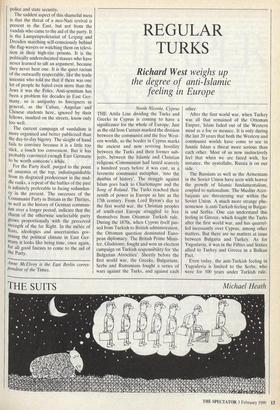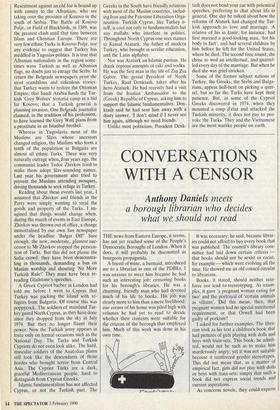REGULAR TURKS
Richard West weighs up the degree of anti-Islamic feeling in Europe
North Nicosia, Cyprus THE Attila Line dividing the Turks and Greeks in Cyprus is coming to have a significance for the whole of Europe. Just as the old Iron Curtain marked the division between the communist and the free West- ern worlds, so the border in Cyprus marks the ancient and now reviving hostility between the Turks and their former sub- jects, between the Islamic and Christian religions.■Communism had lasted scarcely a hundred years before it was cast, in a favourite communist metaphor, 'into the dustbin of history'. The struggle against Islam goes back to Charlemagne and the Song of Roland. The Turks reached their zenith of power in Europe as late as the 17th century. From Lord Byron's day to the first world war, the Christian peoples of south-east Europe struggled to free themselves from Ottoman Turkish rule. During the 1.870s, when Cyprus itself pas- sed from Turkish to British administration, the Ottoman question dominated Euro- pean diplomacy. The British Prime Minis- ter, Gladstone, fought and won an election campaign on Turkish responsibility for 'the Bulgarian Atrocities'. Shortly before the first world war, the Greeks, Bulgarians, Serbs and Rumanians fought a series of wars against the Turks, and against each
other.
After the first world war, when Turkey was all that remained of the Ottoman Empire, Islam faded out of the Western mind as a foe or menace. It is only during the last 20 years that both the Western and communist worlds have come to see in fanatic Islam a threat more serious than each other. Most of us now instinctively feel that when we are faced with, for instance, the ayatollahs, Russia is on our side.
The Russians as well as the Armenians in the Soviet Union have seen with horror the growth of Islamic fundamentalism, coupled to nationalism. The Muslim Azer- baijanis are threatening war within the Soviet Union. A much more strange phe- nomenon is anti-Turkish feeling in Bulgar- ia and Serbia. One can understand this feeling in Greece, which fought the Turks after the first world war, and has quarrel- led incessantly over Cyprus, among other matters. But there are no matters at issue between Bulgaria and Turkey. As for Yugoslavia, it was in the Fifties and Sixties allied to Turkey and Greece in a Balkan Pact.
Even today, the anti-Turkish feeling in Yugoslavia is limited to the Serbs, who were for 500 years under Turkish rule.
Resentment against an old foe is bound up with enmity to the Albanians, who are taking over the province of Kosovo in the south of Serbia. The Battle of Kosovo Polje, or Field of Blackbirds, in 1389, was the greatest clash until that time between Islam and Christian Europe. There are very few ethnic Turks in Kosovo Polje, nor any evidence to suggest that Turkey has meddled in Yugoslav politics. It is true that Albanian nationalists in the region some- times wave Turkish as well as Albanian flags, no doubt just to enrage the Serbs. In return the Belgrade newspapers print the most scandalous and ridiculous stories: that Turkey wants to restore the Ottoman Empire; that Saudi Arabia funds the Tur- kish 'Grey Wolves' terrorist camp in a bid for Kosovo; that a Turkish general is planning invasion. One Belgrade journalist claimed, in the tradition of his profession, to have learned the Grey Wolf plans from a prostitute in an Istanbul brothel.
Whereas in Yugoslavia most of the Muslims are Slays whose ancestors changed religion, the Muslims who form a tenth of the population in Bulgaria are almost all ethnic Turks. There was very naturally outrage when, four years ago, the communist leader Todor Zhivkov tried to make them adopt Slav-sounding names. Last year his government also tried to prevent the Muslims attending mosques, driving thousands to seek refuge in Turkey.
Reading about these events last year, I assumed that Zhivkov and friends in the Party were simply wanting to steal the goods and property of the Turks. I im- agined that things would change when, during the march of events in East Europe, Zhivkov was thrown out of office, a change immortalised by our own Sun newspaper under the headline `13ulgar Off!' Sure enough, the new, moderate, glasnost suc- cessor to Mr Zhivkov stopped the persecu- tion of Turks. But this did not please the Sofia crowd: they have been demonstra- ting in thousands, demanding a ban on Muslim worship and shouting `No More Turkish Rule!' They must have been re- reading Gladstone's speeches.
A Greek Cypriot barber in London had told me before I went to Cyprus that Turkey was packing the island with re- fugees from Bulgaria. Of course this was poppycock. The soldiers of mainland Tur- key guard North Cyprus, as they have done since they dropped from the sky in July 1974. But they no longer flaunt their power. Now the Turkish army appears in force only on formal occasions such as the National Day. The Turks and Turkish Cypriots do not even look alike. The hard, muscular soldiers of the Anatolian plains still look like the descendants of those hordes who brought terror from Central Asia. The Cypriot Turks are a dark, graceful Mediterranean people, hard to distinguish from Cypriot Creeks.
Islamic fundamentalism has not affected Cyprus, or not the Turkish part. The Greeks in the South have friendly relations with most of the Muslim countries, includ- ing Iran and the Palestine Liberation Orga- nisation. Turkish Cyprus, like Turkey it- self, is cool not only to fundamentalists but any mullahs who interfere in politics. Throughout North Cyprus one sees statues to Kemal Ataturk, the father of modern Turkey, who brought in secular education, and the Latin alphabet.
Nor was Ataturk an Islamic puritan. He drank copious amounts of raki and vodka. He was the first man in the life of Zsa Zsa Gabor. The genial President of North Turkey, Rauf Denktash, takes after his hero Ataturk. He had recently had a visit from the Iranian Ambassador to the (Greek) Republic of Cyprus, asking him to support the Islamic fundamentalists. Den- ktash said he had sent him away with a dusty answer. 'I don't mind if I never see him again, although we need friends.'
Unlike most politicians, President Denk- tash does not bend your ear with polemical speeches, preferring to chat about life in general. One day he talked about how the reforms of Ataturk had changed the Tur- kish approach to love and marriage. A relative of his in Izmir, for instance, had first married a good-looking man, 'for his body in fact', and had several children by him before he left for the United States, where he died. The second time round, she chose to wed an intellectual, and quarrel- led every day of the marriage. But when he died she was grief-stricken.
Some of the former subject nations of Turkey, the Greeks, the Serbs and Bulga- rians, appear hell-bent on picking a quar- rel, but so far the Turks have kept their patience. But, as some of the Cypriot Greeks discovered in 1974, when they mounted a coup d'etat and attacked the Turkish minority, it does not pay to pro- voke the Turks. They and the Vietnamese are the most warlike people on earth.



















































 Previous page
Previous page